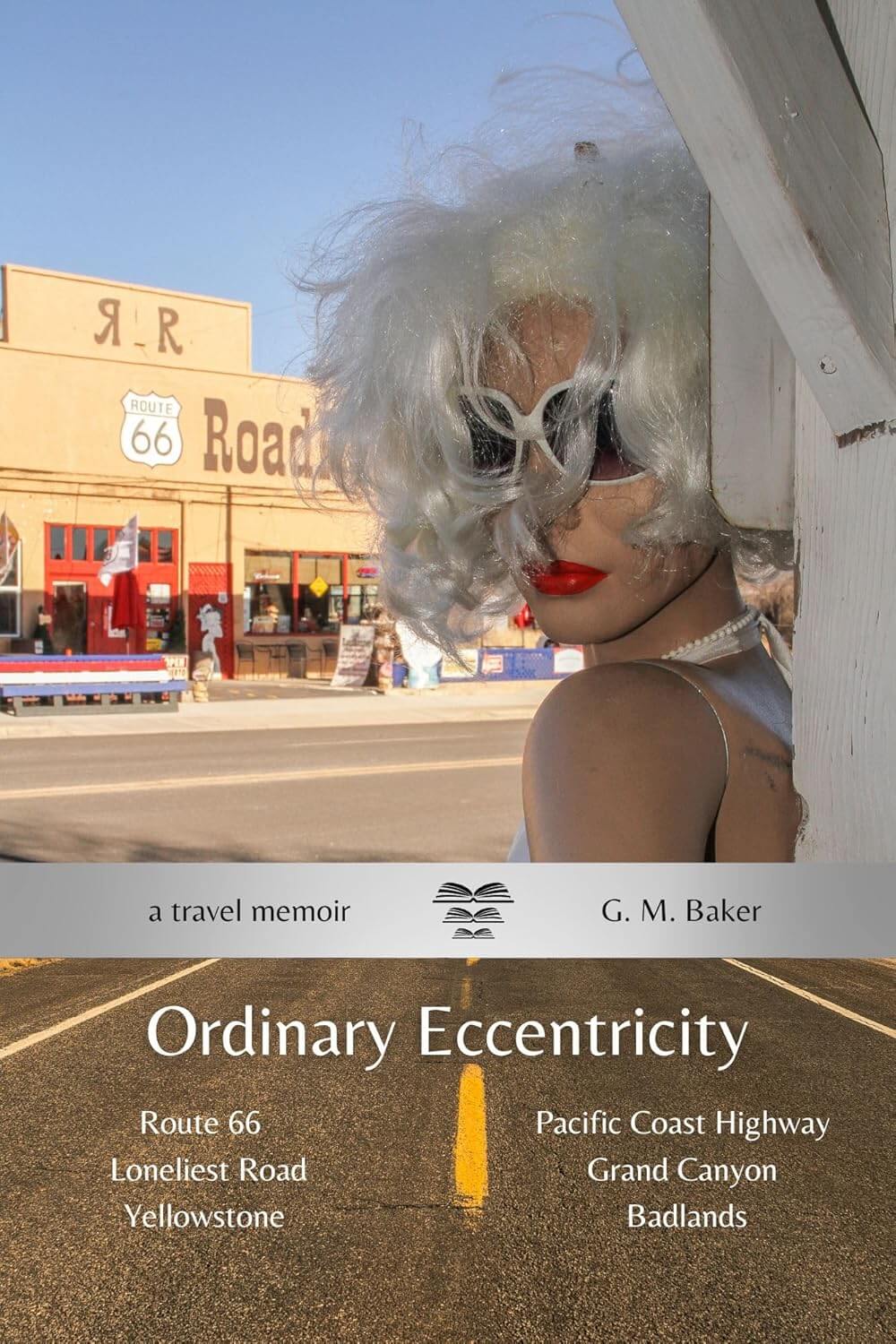Genre
Audience
Author’s Worldview
Year Published
2022
Themes
Reviewed by
When I learned that G.M Baker wrote a traveling memoir, Ordinary Eccentricity, I knew I wanted to read it. I had recently finished his pilgrimage fiction, The Wanderer and the Way, and I was interested in seeing the author in his own adventure.
Now, if the only information that I had was the cover—which features a female mannequin with red lipstick wearing a white wig and a halter-top, a cheap pearl necklace and large sunglasses, placed on a storefront outside a Route 66 stop—I don’t know if I would have picked it up. You see, I am not attracted by gimmicks, or as Baker might put it ‘kitschy’. But knowing the author to be witty, his title, Ordinary Eccentricity (a seemingly contradictory combination) hooked me. I soon found out that the cover was apt, and even felt inviting.
Ordinary Eccentricity follows two transcontinental road trips that Canadian couple, Mark and his wife, Anna, took through America (one in 2018 and the other in 2019). Wanderlust or nostalgia enthusiasts will appreciate the variety of landscapes, communities and people encountered as the Bakers begin in the Land of Lincoln, make their way to the Pacific Coast Hwy via Route 66, and as they circle back to the east from Portland, Oregon to Muskegon, Michigan. Their second trip takes them from Kitchener, Ontario, to Washington DC, then to San Jose, California. Readers will be taken to the Land of Enchantment and to the Badlands, to the Ozarks Rainbow Bridge and to Yellowstone, to the Meteor Crater and to the Petrified Forest. However, readers need not have traversed through many of these famous American routes, experienced the heat of St. Louis or the thin air of the Grand Canyon, or visited many of these destinations to enjoy the deeper content of this memoir. For Baker, the romance of the journey was not in roads themselves, the monuments or even the wonders, “but the ever unfolding view, the thousand tiny attractions, a miscellany that slowly reveals its unity.”
As you can see, Baker’s memoir is a philosophical one; it’s not simply about a couple reaching select destinations, nor is it dramatic. This is not an unexpected life adventure, nor man versus nature theme, nor the finding of oneself after some traumatic event, rather it is a much fuller story: a history, a snapshot of the past ever evolving with the present; a natural allegory making sense of disperse encounters; and a personal journey—yet one that is familiar to thousands of others. A story that many people are experiencing and preserving even in this moment. In fact, by writing this memoir, Baker has become one the ordinary people who has memorialized the eccentricity of the road.
In this book, you will find a man who hates being in the way; a man who is limited by claustrophobia and shortness of breath; a man who travels by car and sleeps in hotels; a man who visits family; a man who quotes Steinbeck and Chesterton; a man who values stories.
Being Catholic, Baker does bring some aspects of Catholicism into his commentary, such as likening the secular relics of the road to the allure of saint relics, or comparing church architecture and aesthetics. He speaks of spiritual things, yet he is not overtly religious. For Baker the road is a quest, nay, a pilgrimage, something with a definite beginning and end that can bring about a certain satisfaction—that of completion—one that lounging on the beach simply cannot. By travelling with Baker, one will find that physicality matters, that the way things look matter, and that the way that things taste matter. That traveling has the ability to open one’s eyes to the particularity of familiar things, and to expand the appreciation of one’s own ‘ordinary eccentricity’.
Ordinary Eccentricity is witty, humble and even poetic. I recommend it for all who are interested in journeying. A love of historic routes are a bonus as is the desire to discover the perfect taco.



